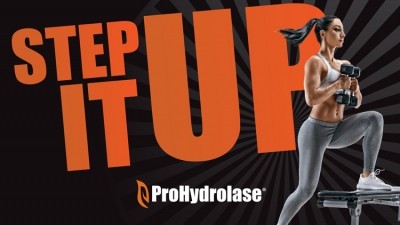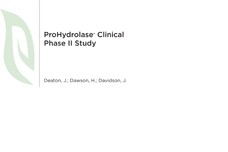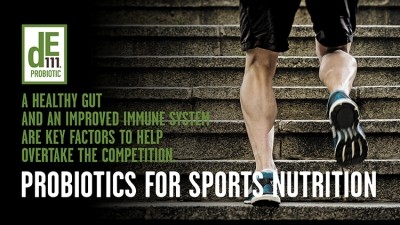Promotional Features
Competitive edge: How digestive supplements provide power and performance
No matter the sport or fitness activity, the individual requires both strength and energy. A powerlifter needs energy to raise that several-hundred-pound bar, while the marathoner relies on his muscles to further his stride.
Supplements typically found in the digestive support aisle, enzymes and probiotics, have been revealed in research to provide desirable effects on sports performance.
Getting more out of whey
Despite growth of numerous new plant proteins, whey protein remains the dominant protein powder used by athletes and fitness enthusiasts. It remains appealing due to its amino acid profile. Whey offers the highest percentage of essential amino acids, 25% of which are leucine, isoleucine and valine, the branched-chain amino acid trio that is the most important for muscle building and repair.
But whey often poses some challenges and cannot be fully utilized by the muscles if it is not fully absorbed. Proteases are enzymes that work to break down and assimilate whey proteins, which are large chains of amino acids bound together in a peptide complex.
Ideally, for whey to help promote muscle growth and strength, it should be digested to at least the tetra-peptide level within 90 minutes to be used by the body. Absorption takes place in the small intestines. Larger protein fragments cannot be absorbed so they become food for the microflora in the large intestine, contributing to gas and bloating.
A recent double-blind, placebo-controlled clinical study of a protease enzyme compound (ProHydrolase) combined with whey protein has shown improved digestion and absorption of amino acids along with reduction of the immunogenic responses associated with whey protein consumption, compared to whey protein alone. Participants in the study took the supplement-whey combination for nine days and the whey alone for nine days.
At the end of the study, the researchers found that total amino acid concentrations in the blood increased significantly (by 20%) more after taking the whey protein and enzyme combination than whey alone.
When taken with whey protein, the multi-enzyme complex encourages pre-digestion of the protein, allowing for the release of the full content of the essential amino acids for building muscle and improving muscle recovery. Pre-digestion also creates smaller peptides, reducing the potential for discomfort often associated with protein consumption. During digestion, whey protein is broken down into peptides, which are then reduced into amino acids that become absorbed in the intestinal tract.
When analyzing the data, the researchers also discovered that the participants in the combination phase had significantly decreased levels of the pro-inflammatory marker c-reactive protein (CRP), compared to when they took the whey by itself. The bioactive peptides created by the hydrolyzed protein curtailed CRP production, indicating a lower level of inflammation in the body.
Probiotics for the long run
Endurance tests such as marathons can be gut wrenching for the athlete. Literally. Research has shown that nine out of 15 runners experienced gastrointestinal distress, including nausea (89%), cramps (44%), diarrhea (44%) and vomiting (22%). Another study showed that up to 93% of long-distance triathletes showed gastrointestinal symptoms.
But that's not all - both endurance and power athletes become more vulnerable to bacterial and viral infections for up to 72 hours following competition or rigorous training.
The proper probiotic can help these athletes by promoting optimal digestion and immune function. Athletes and active individuals have higher nutrient needs than more sedentary people, and these nutrient requirements are met when digestion is improved. Improved or sustained healthy digestion results largely from the proper ratio of beneficial bacteria over benign or pathogenic bacteria in the gut.
One such strain of beneficial bacteria, Bacillus subtilis, is a probiotic spore that has been shown to "police" the gut bacteria community, ensuring that the healthy ratio is created and sustained. This spore probiotic also pulls double duty as a macronutrient breakdown facilitator: one study showed B. subtilis DE111 assists in digestion of fats and sugars into beneficial small chain fatty acids, such as butyric acid, which is important in maintaining functionality of the large intestine. And now we can begin to see how it can benefit marathoners.
Approximately 60% of long-distance runners report being impacted by gastrointestinal discomfort and many suffer from bouts of diarrhea; endurance athletes tend to experience issues stemming from reduced blood flow to the intestines. This is then redirected to the muscles, which affects the intestines and results in disrupted absorption. In a clinical study, individuals who consumed the B. subtilis DE111 supplement experienced a significant increase in the proportion of normal stools, from 37% to 43% in a span of 12 weeks. In contrast, the placebo participants showed no change.
Immunity - resilience - is ironically impacted in the athlete. Ironic, because athletes are in enviable physical shape and the notion of such virile physiques being vulnerable to any infection sounds nonsensical. However, when the body is routinely subjected to physical stress the immune system is impacted as limit-pushing exercise or competition creates acute changes in the secretion of antibodies, increasing risk of illness. The gut harbors 70% of the body's immune cells. Probiotic bacteria adhere to the gut epithelium (the barrier) boosting its functionality by preventing the adhesion of pathogens. DE111 has shown the ability to adhere to intestinal cells, as indicated by testing using Caco-2 cells. In addition, the genome sequencing of this B. subtilis shows that the strain contains genes that support the body's production of the antibodies IgG and IgA. The presence of these antibodies primes one's system to be prepared when foreign bodies attack.
Conclusion
The global sports nutrition market is expected to reach $28.37bn in sales by 2022 as more people take control of their health and well-being via exercise, and as more athletes become aware of how to keep themselves resilient through and after rigorous competition. Formulating with enzymes and probiotics specifically for exercise and competition is the "whey" to go.






